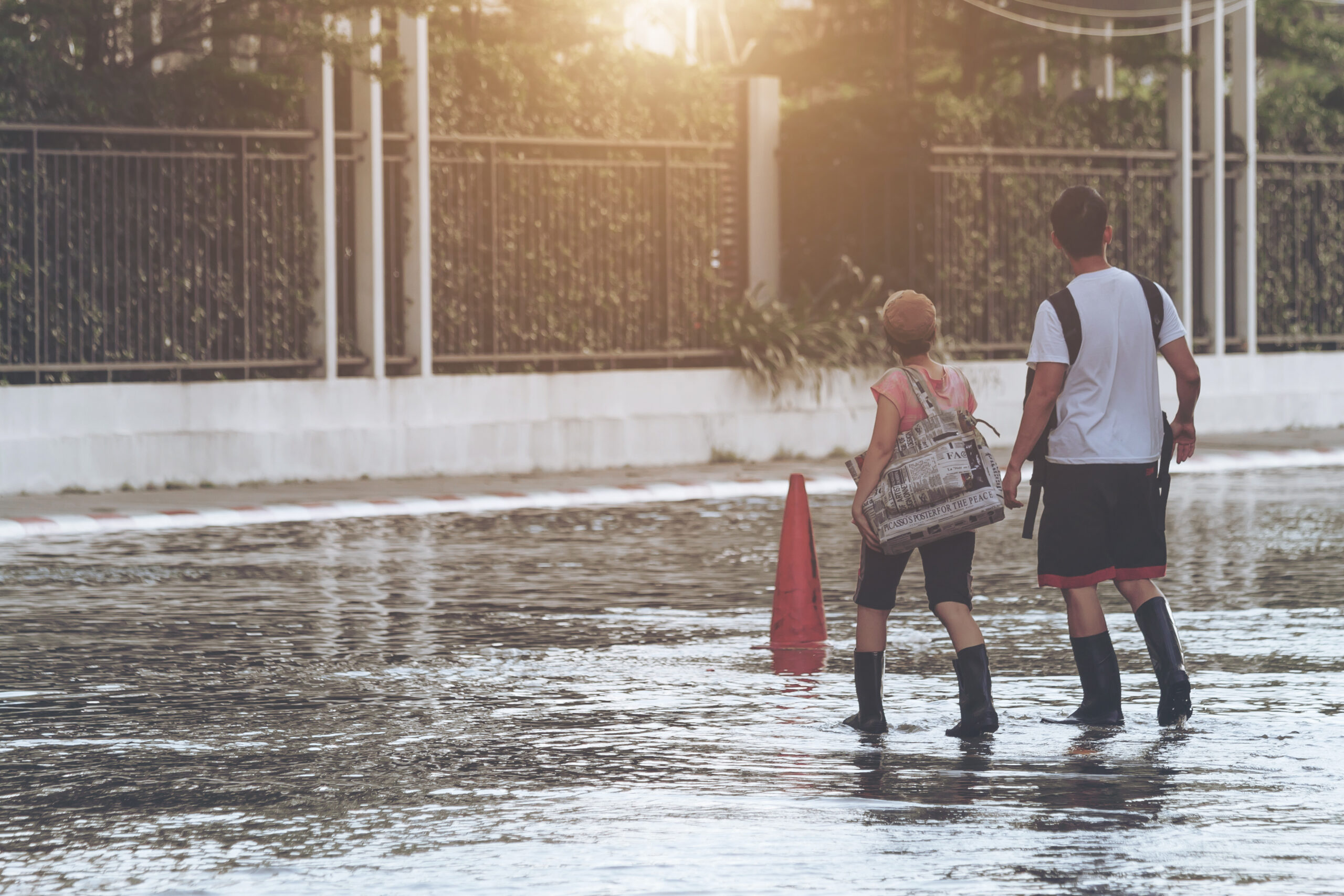
People wade through flood, concept of natural disaster.
Natural disasters can happen without warning, leaving communities and homeowners scrambling. To be prepared for the next time a natural disaster strikes, it’s important to have a plan and the right resources in place. Here are five essential resources to have on hand when natural disasters strike.
Non-Perishable Food and Water
When a natural disaster hits, grocery stores and restaurants will likely be closed, so it’s important to have enough food and water on hand to last you and your family for several days. Non-perishable items like canned goods, dry cereal, peanut butter, and bottled water are essential. And don’t forget about pet food!
Other non-perishable items to have stored include protein bars, trail mix, granola, jerky, dried fruits, and nuts. It’s also a good idea to have a supply of canned meats like tuna or chicken. Additionally, having energy drinks and electrolyte powders may help you stay hydrated during challenging times. Freeze-dried meals and MREs (meals-ready-to-eat) are also great options that can be prepared quickly with just water. Make sure to check expiration dates regularly when stocking up on supplies.
A Well-Stocked First-Aid Kit
During a natural disaster, medical help may not be readily available, so it’s important to have a first-aid kit on hand. This should include items like bandages, gauze, antiseptic wipes, pain relievers, and more.
A well-stocked first aid kit should include items beyond the basics like antiseptics and bandages. Items such as thermometers, scissors, tweezers, latex gloves, splints, and medical tape are all important to have on hand in case of an emergency. Additionally, having medications for allergies or common ailments can help quickly treat any minor issues that may arise. It’s also important to consider personal items, like hand sanitizer and insect repellent, as well as eyewear and hearing protection if necessary.
A Battery-Operated Radio
Having a battery-operated radio on hand is essential during a natural disaster. This will allow you to stay up-to-date on weather conditions and emergency updates from your local news station. Make sure to have extra batteries in case of power outages.
If you don’t know how to use a battery-operated radio, it’s important to familiarize yourself with the device. Generally speaking, radios have an On/Off switch and a volume knob, as well as preset station buttons for easy tuning. To tune in to your local news station, simply hold down the button that corresponds with that station until the sound is clear.
A Backup Boiler
Having a backup boiler on hand is essential in the event of a power outage due to a natural disaster. A backup boiler will allow you to keep your home warm and provide hot water for daily needs such as washing, cooking, and bathing. Make sure to invest in a reliable model that is easy to install and use. If you are on the fence about investing in a boiler, there are services that allow boiler rental for businesses, commercial properties, and homes.
It’s important to know how to operate a boiler safely in order to avoid injury or damage. When using a boiler, be sure to follow all manufacturer instructions and keep combustible materials away from the heat source. Additionally, examine the area around the boiler for safety hazards such as loose wiring, gas leaks, water leaks, and more. Before starting the boiler, open a window or door to allow fresh air into the room. Lastly, make sure to turn off the boiler when it’s not in use and never leave it running unattended.
Cash
ATMs may not be working during or after a natural disaster, so it’s always good to have cash on hand. Keep small bills in an easily accessible place so you can buy necessary items like gas or supplies if needed.
It’s important to keep your money safe and dry in the event of a natural disaster. Investing in a waterproof container or money belt is ideal for keeping cash secure and accessible during challenging times. Additionally, if you have extra room in your emergency kit, consider adding an extra pair of socks or an envelope that can be used to store cash in a dry location.
If you have access to an airtight container, storing paper money in a plastic bag or resealable sandwich bags can also help keep it safe from moisture and dirt. Finally, make sure to check your cash regularly for signs of mold, dampness or other damage. With the right preparation and resources, you can be ready for whatever comes your way.
This article discussed five essential resources to have on hand when natural disasters strike. From non-perishable food and water, to a well-stocked first-aid kit, battery operated radio, backup boiler, and cash—having these resources in place is the best way to be prepared for whatever comes your way. The most important thing is to stay informed and aware of your local news station for updates on weather conditions and emergency alerts. With the right preparation in place, you can face the next natural disaster with confidence.


